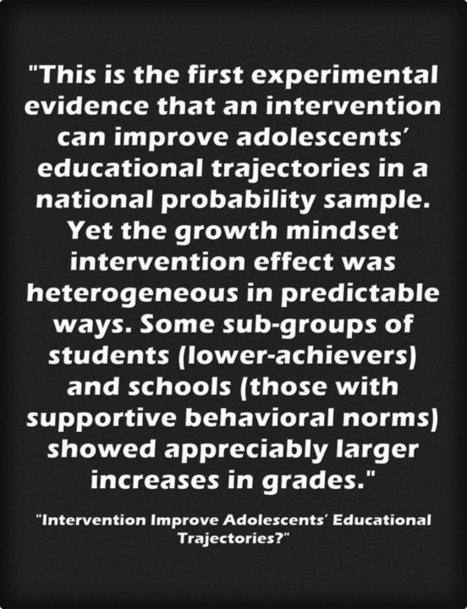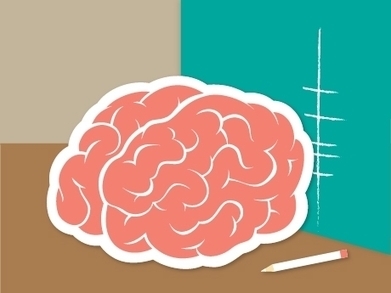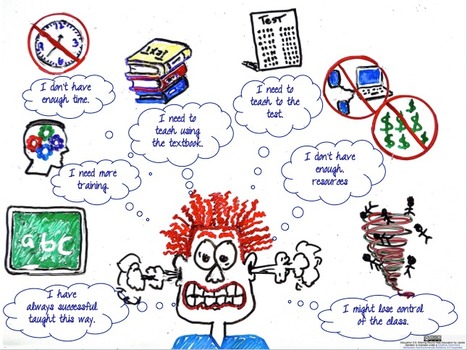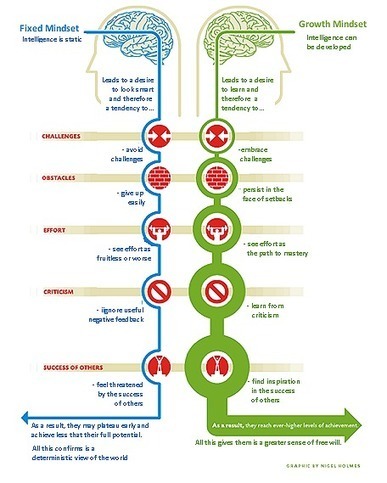 Your new post is loading...
 Your new post is loading...
There are two theories of intelligence, referred to simply as mindsets, that students can have about their intellectual abilities, although no one has purely one or the other, she said. Individuals with more of a fixed mindset believe that their intellectual abilities are simply fixed. They tend to approach learning with the goal of looking smart, and they often shy away from challenges because they believe that having to work hard at something or making mistakes means they don’t have high ability. Those with more of a growth mindset, on the other hand, believe that abilities can be developed—they are more likely to see effort as something that propels learning and to see setbacks as opportunities to build new skills.
These divergent mindsets are also reflected in how individuals process mistakes on a neurological level. In a study of 25 undergraduate students, Jason S. Moser (Michigan State University) and colleagues tasked participants with rapidly identifying the center letter in a string of similar text (e.g. “M” vs. “N”) while monitoring activity of the anterior cingulate cortex (ACC) and related brain areas associated with cognitive control of behavior, via electroencephalography. The students also completed a scale designed to measure fixed and growth mindsets.
Over the course of 480 trials, participants with growth mindsets demonstrated greater error positivity and greater electrical activity in the ACC and related brain regions associated with attending to mistakes compared with those with fixed mindsets. This boost in Pe was also associated with greater posterror accuracy, suggesting that these participants were processing errors more deeply, allowing them to make corrections immediately. Learn more / En savoir plus / Mehr erfahren: http://www.scoop.it/t/21st-century-learning-and-teaching/?&tag=carol+dweck http://www.scoop.it/t/21st-century-learning-and-teaching/?&tag=Growth+Mindset
Via Gust MEES, Jim Lerman
What would you say are a few of the biggest myths about growth mindset?
OK, myth No.1 is the myth that it’s all about effort, and that you instil it by praising effort. Effort is one factor that leads to learning. So the ultimate value is growth, progress, learning. And effort is one thing that leads there but there are many other things – strategies, using resources, getting advice, guidance and mentorship, and when people leave that out and just praise effort, it’s not transmitting a growth mindset. Adults have nagged children for centuries to try harder. That’s not a growth mindset, it’s an adult nagging a child to try harder!
Also, we find that when teachers think it’s just about effort and praising effort they may praise effort that isn’t even there, or that’s not effective. So if a child tries hard at something and you say ‘great job, you tried hard’, but they didn’t make progress, they didn’t advance, you’re actually conveying a fixed mindset because you’re saying ‘great effort, I didn’t really expect you to do that, and I don’t expect you to do that, so I’m trying to make you feel good about not doing it’. So we need people to understand that it’s appreciating a variety of process variables that lead to learning.
The second myth is that you can teach students a lesson on growth mindset and put a poster up in the front of the room, and that’s that, that they will have a growth mindset from then on. And we know if the teacher doesn’t then embody a growth mindset, if teachers don’t embody growth mindsets in their teaching practices, in the way that they give feedback when the child is stuck, and the way they present a new unit, in the way that they give opportunities for revision and growth of understanding – if they don’t embody that growth mindset, they are not teaching it. And in fact, if their behaviour contradicts the poster at the front of the room, then maybe they’re doing a disservice. Learn more / En savoir plus / Mehr erfahren: http://www.scoop.it/t/21st-century-learning-and-teaching/?&tag=carol+dweck http://www.scoop.it/t/21st-century-learning-and-teaching/?&tag=Growth+Mindset
Via Gust MEES, Jim Lerman
Beth Dichter's insight: This chart looks at the difference between a fixed mindset and a growth mindset by looking at eight areas: * Desire * Evaluation of situations * Dealing with setbacks * Challenges * Effort * Criticism * Success of others * Result... You may want to share this with students or other teachers at your school.
Via Beth Dichter

|
Scooped by
Jim Lerman
|
by Heidi Grant Halvoson, Ph.D.
"Researchers have uncovered the reason for this difference in how difficulty is interpreted, and it is simply this: more often than not, bright girls believe that their abilities are innate and unchangeable, while bright boys believe that they can develop ability through effort and practice.
"How do girls and boys develop these different views? Most likely, it has to do with the kinds of feedback we get from parents and teachers as young children. Girls, who develop self-control earlier and are better able to follow instructions, are often praised for their "goodness." When we do well in school, we are told that we are "so smart," "so clever, " or " such a good student." This kind of praise implies that traits like smartness, cleverness, and goodness are qualities you either have or you don't.
"Boys, on the other hand, are a handful. Just trying to get boys to sit still and pay attention is a real challenge for any parent or teacher. As a result, boys are given a lot more feedback that emphasizes effort (e.g., "If you would just pay attention you could learn this," "If you would just try a little harder you could get it right.") The net result: When learning something new is truly difficult, girls take it as sign that they aren't "good" and "smart", and boys take it as a sign to pay attention and try harder."
|
Thanks to Benjamin Riley, this morning I learned about the results of a big new growth mindset study that was released yesterday, Where and For Whom Can a Brief, Scalable Mindset Intervention Improve Adolescents’ Educational Trajectories? (happily, not behind a paywall).
It’s written by a zillion of the biggest names in Social Emotional Learning Research (David Yeager, Paul Hanselman, David Paunesku, Christopher Hulleman, Carol Dweck, Chandra Muller, Robert Crosnoe, Gregory Walton, Elizabeth Tipton, Angela Duckworth).
Using a representative sample of U.S. schools and their students, they found that students doing two twenty-five minute online lessons about a growth mindset resulted in a small but important academic gain (measured by GPA’s), with larger improvements found among students who had a track record of experiencing academic and socio/economic challenges.
Via John Evans, Cheryl Turner, Jim Lerman
It's important to recognize that a growth mindset is an overall paradigm for personal development rather than a pedagogical tool for measuring academic accomplishment. 5 Growth Mindset PracticesIn their groundbreaking book, Professional Learning Communities at Work, Richard DuFour and Robert Eaker say it clearly when pointing out the issue that comes about when change initiatives are considered "a task to complete rather than an ongoing process." If we really want to improve our schools, our work, and the education of our students, we can do so by adopting a new mindset -- for everyone -- that would include: - Being humble enough to accept that there are things about ourselves and our practices that can improve
- Becoming part of professional teams that value constructive critique instead of criticism
- Treating setbacks as formative struggles within the learning process instead of summative failures
- Realizing the restrictive role that timelines can play in reaching high standards, and using foundational philosophies such as Universal Design for Learning (UDL) to map systems so that everyone's growth is supported
- Create flexible grouping at all times so that nobody's trapped in any one course level or particular type of work.
Learn more / En savoir plus / Mehr erfahren: http://www.scoop.it/t/21st-century-learning-and-teaching/?&tag=Growth+Mindset
Via Ana Cristina Pratas, Miloš Bajčetić, Gust MEES, Jim Lerman
"Educational psychology has focused on the concepts of learned helplessness and more currently growth-fixed mindsets as a way to explain how and why students give up in the classroom setting. These ideas can also be applied to educators in this day of forced standardization, testing, scripted curriculum, and school initiatives."
Via Beth Dichter, davidconover
|



 Your new post is loading...
Your new post is loading...




























There are two theories of intelligence, referred to simply as mindsets, that students can have about their intellectual abilities, although no one has purely one or the other, she said. Individuals with more of a fixed mindset believe that their intellectual abilities are simply fixed. They tend to approach learning with the goal of looking smart, and they often shy away from challenges because they believe that having to work hard at something or making mistakes means they don’t have high ability. Those with more of a growth mindset, on the other hand, believe that abilities can be developed—they are more likely to see effort as something that propels learning and to see setbacks as opportunities to build new skills.
These divergent mindsets are also reflected in how individuals process mistakes on a neurological level. In a study of 25 undergraduate students, Jason S. Moser (Michigan State University) and colleagues tasked participants with rapidly identifying the center letter in a string of similar text (e.g. “M” vs. “N”) while monitoring activity of the anterior cingulate cortex (ACC) and related brain areas associated with cognitive control of behavior, via electroencephalography. The students also completed a scale designed to measure fixed and growth mindsets.
Over the course of 480 trials, participants with growth mindsets demonstrated greater error positivity and greater electrical activity in the ACC and related brain regions associated with attending to mistakes compared with those with fixed mindsets. This boost in Pe was also associated with greater posterror accuracy, suggesting that these participants were processing errors more deeply, allowing them to make corrections immediately.
Learn more / En savoir plus / Mehr erfahren:
http://www.scoop.it/t/21st-century-learning-and-teaching/?&tag=carol+dweck
http://www.scoop.it/t/21st-century-learning-and-teaching/?&tag=Growth+Mindset
LIVESTOCK ANIMAL EXCHANGE
Testimonials
Raghuram Rastra
Productions to produce a new show about the Beefmaster breed. We continuously receive positive feedback from breeders and commercial cattlemen, so we continue to rely on The American Rancher for advertising opportunities. Great experience!”mineral for our cows this past spring. Now we are using the Vita Charge® Stress Tub and Stress Tub HEAT®. Even with the stress of …Read More
Mrs Sudana Bric
A great book for all ages! livestockanimalexchange.com
Animal Farm is a very good book. I personally think that it’s a book for all ages. For example, little kids can read it and just think it’s a fairy tale about animals whereas, older kids will probably get the true message and understand that it’s about power.
Mr Rob Roy
Animal Farm does not exactly fit the ideal of a modernist novel, as it is written using traditional forms—fable, fairytale, allegory—but it does fit the first two characteristics, at least to some extent. Orwell’s fable is a critique of the modern world, especially of Soviet i recomment https://www.livestockanimalexchange.com/
Gallery
ESCROW SERVICES
Veterinary Department
Dorper sheep breed
Angora Goats For Sale With Good Discount
Excited Student in College
Student in Library
Student Speech during her graduation
Students in Classroom
Published Notice
15 Oct
LEICESTER LONGWOOL SHEEP FOR SALE
LEICESTER LONGWOOL SHEEP FOR SALE Leicester Longwool sheep for sale The Leicester Longwool is one of the “luster longwool” breeds, so designated for the sheen and brilliance of their wool. The sheep appear to shine just after shearing, when the clean wool next to their skin catches the sunlight and makes them glisten for a…
12 Oct
RED BRAHMAN CATTLE FOR SALE
Here at https://www.livestockanimalexchange.com/ , we understand the value of purebred Brahman genetics. We emphasize performance, soundness, fertility and beef production in our Brahman herds. With both gray Brahman and red Brahman cattle for sale, Moreno Ranches is one of the top sellers of Brahman cattle in Florida and now in Texas, too. In fact, people looking for Brahman…
17 Oct
HOLSTEIN HEIFERS CATTLE FOR SALE
HOLSTEIN HEIFERS CATTLE FOR SALE, beef carcass meat, pregnant heifers as well as customers special orders based on the shipping within usa
Contact Us Today
Name *
First
Last
Numbers
Email *
Comment or Message *
CONTACT US ONLINE 24/7 LIVE CHAT
Contact Rent-A-Center online through our customer service inquiry and you will … make your experience more enjoyable, please call us or send us a message. Get answers to the most popular FAQs and easily contact us through either a secure email address, a mailing address WE ARE ALSO ONLINE 24/7 ON OUR LIVE CHAT FEEL FREE TO CONTACT US if we have been this successful in business, it’s because we are honest, reliable and always satisfy our customers,
The American Brahman breed of cattle originated from Bos Indicus cattle. These hardy cattle were originally brought to the United Stated from India. The American Brahman was the first beef cattle breed developed in the United States. The American Brahman are for the most part the result of a cross of four different Indian cattle breeds: Gyr, Guzerat, Nelore and Krishna Valley. Best place to buy livestock online at Livestock Animal Exchange.
The American Brahman cattle originated from a nucleus of approximately 266 bulls and 22 females of several Bos indicus varieties of cattle which were imported into the United States between 1854 and 1926. The American Brahman has been used to develop numerous other U.S. Beef Breeds of cattle including Brangus, Beefmaster, Simbrah and Santa Gertrudis.
Brahman cattle are known for their extreme tolerance to heat and are widespread in tropical regions. They are resistant to insects due to their thick skin. Brahman cattle live longer than many other breeds, often producing calves at ages 15 and older. Best place to order livestock online
At Bulter Brahmans we have both Polled Brahman Cattle as well as Horned Brahman Cattle. If you are looking for Polled Brahman bulls, Polled Brahman heifers, horned Brahman bulls or horned Brahman heifers, we always have a nice selection of American Brahman Cattle available for sale. Best place to buy livestock online within USA and worldwide with express delivery.
Buy Angus Cattle Online,
AVAILABLE CATTLE BRREDS FOR SALE:
Angus cattle for sale
Beefmaster cattle for sale
Brahman cattle for sale
Charolais cattle for sale
Fleckvieh cattle for sale
Girolando cattle for sale
Hereford cattle for sale
Holstein cattle for sale
Limousin cattle for sale
Jersey cattle for sale
AVAILABLE SHEEP BREEDS FOR SALE:
Awassi sheep for sale
Dorset sheep for sale
Dorper sheep for sale
Merino Sheep for sale
Leicester Longwool sheep for sale
Lincoln Sheep for sale
AVAILABLE GOAT BREEDS FOR SALE:
Alpine goats for sale
Boer goats for sale
Spanish goats for sale
Toggenburg goats for sale
White saanen goats for sale
Kalahari goats for sale
AVAILABLE CHICKEN FOR SALE
Boiler chickens for sale
For more details, do not hesitate to contact us.
https://www.livestockanimalexchange.com/en/product/alpine-goats-for-sale/
https://www.livestockanimalexchange.com/en/product/boer-goats-for-sale/
https://www.livestockanimalexchange.com/en/product/black-spanish-goats-for-sale/
https://www.livestockanimalexchange.com/en/product/kalahari-red-goat-for-sale/
https://www.livestockanimalexchange.com/en/product/toggenburg-goat-for-sale/
https://www.livestockanimalexchange.com/en/product/white-saanen-goats-for-sale/
https://www.livestockanimalexchange.com/en/product/angus-cattle-for-sale/
https://www.livestockanimalexchange.com/en/product/beefmaster-cattle-for-sale/
https://www.livestockanimalexchange.com/en/product/charolais-cattle-for-sale/
https://www.livestockanimalexchange.com/en/product/fleckvieh-cattle-for-sale/
https://www.livestockanimalexchange.com/en/product/girolando-cattle-for-sale/
https://www.livestockanimalexchange.com/en/product/hereford-cattle-for-sale/
https://www.livestockanimalexchange.com/en/product/holstein-cattle-for-sale/
https://www.livestockanimalexchange.com/en/product/limousin-cattle-for-sale/
https://www.livestockanimalexchange.com/en/product/jersey-cattle-for-sale/
https://www.livestockanimalexchange.com/en/product/brahman-cattle-for-sale/
https://www.livestockanimalexchange.com/en/product/awassi-sheep-for-sale/
https://www.livestockanimalexchange.com/en/product/dorset-sheep-for-sale/
https://www.livestockanimalexchange.com/en/product/dorper-sheep-for-sale/
https://www.livestockanimalexchange.com/en/product/leicester-longwool-sheep-for-sale/
https://www.livestockanimalexchange.com/en/product/lincoln-sheep-for-sale/
https://www.livestockanimalexchange.com/en/product/merino-sheep-for-sale/
https://www.livestockanimalexchange.com/en/product/boiler-chickens--for-sale/